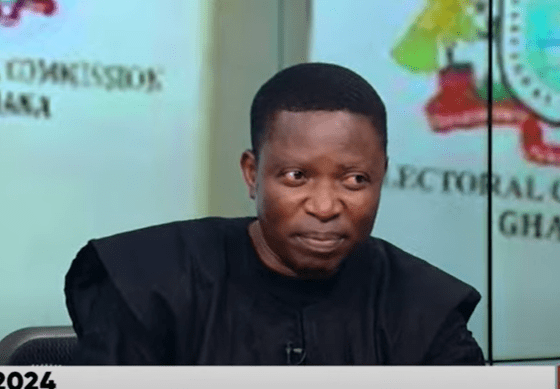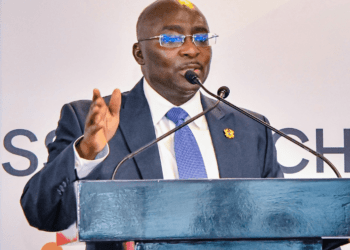The Deputy Director of Elections and IT for the National Democratic Congress (NDC), Dr. Tanko Rashid Tanko has reaffirmed his party’s confidence in securing the disputed parliamentary seat.
Speaking on the electoral processes, he emphasized the importance of the pink sheets. He emphasized;
“What is important is the primary source, which is the pink sheet. Okay. The pink sheet is what they used to put the figures together into the form 1C, which is the constituency collation form.’’
Dr. Tanko Rashid Tanko Deputy Director of Elections and IT for the National Democratic Congress (NDC)
Dr. Tanko pointed out the structured process through which results are collated and validated.
“Now when the form 1C is generated, then another form is generated known as the form 1D, which is a summary sheet. That is the one the returning officer will use to declare the winner of the contest. And copies are given to agents. That is the form 1C and form 1D. These two copies are given to the agents of each of the candidates.
“When there is a contest of that nature in court, they will be looking for the form 1C and the form 1D to assess the results. Because form 1C will have all the aggregated figures of each of the polling stations. It is when they are having difficulties in getting it, then they will now resort to the pink sheet. They don’t go to the ballot papers.”
Dr. Tanko Rashid Tanko Deputy Director of Elections and IT for the National Democratic Congress (NDC)
Addressing the burning of ballot papers at the Ablekuma North Collation Centre, Dr. Tanko described;
“Burning ballot papers doesn’t change anything. It’s neither here nor there. So long as the pink sheets are available, and then the summary sheet and the collation forms are available, the court can determine any issues concerning a declaration.”
Dr. Tanko Rashid Tanko Deputy Director of Elections and IT for the National Democratic Congress (NDC)

Dr. Tanko concluded by noting that recounts can only occur at the polling station level. He emphasized;
“Ballot papers are for recounts, and that one can only happen at the polling station. If you don’t ask for a recount at the polling station, you don’t come to the collation center and ask for a recount.”
Dr. Tanko Rashid Tanko Deputy Director of Elections and IT for the National Democratic Congress (NDC)
Police Address Violence at Ablekuma North Collation Centre
Meanwhile, The Ghana Police Service has issued a statement condemning the violent incidents that occurred at the Ablekuma North Collation Centre, where ballot boxes at the Kwashieman Cluster of Schools were vandalized and set on fire.
“We wish to assure the public that any individual or group of individuals found responsible for this incident will be arrested and brought to face justice. We urge the public to remain calm as investigations into the incident continue.”
Ghana Police Service
The police highlighted that the incident was part of a broader wave of post-election disturbances. As of now, 132 suspects have been arrested nationwide. Out of this figure; 45 suspects have been remanded into custody, 71 suspects are on police inquiry bail, and 16 suspects are on court bail.
The statement further reiterated the service’s commitment to maintaining peace and order as the investigations progress.

However, in the wake of the disputed parliamentary seats, the NDC has filed a lawsuit to prevent the Electoral Commission (EC) from recollecting results in constituencies where the party believes it secured victories.
Among the constituencies in focus are; Ablekuma North, Okaikwei Central, Tema Central, and Obuasi East
These areas, traditionally described as strongholds of the governing New Patriotic Party (NPP), were declared in favor of the NDC candidates.
However, the NPP has contested the results, insisting that their collated figures show otherwise.
The EC’s role in resolving disputes in such contentious constituencies has drawn significant attention, with the NDC maintaining that the existing collation forms and pink sheets are sufficient evidence to validate their claim.
The disturbances at the Ablekuma North Collation Centre have heightened tensions surrounding the disputed seat.
Analysts believe that the final court decision will hinge heavily on Form 1C and Form 1D, as described by Dr. Tanko.
Keen political observers have also noted a historical voting pattern in the disputed constituencies. Okaikwei Central, Ablekuma North, Tema Central, and Obuasi East have traditionally favored the NPP in previous parliamentary elections.
In contrast, the situation in Dome Kwabenya remains unresolved, with the EC suspending the declaration of results in the constituency.
The incidents at the Ablekuma North Collation Centre and the subsequent legal contest underscore the complexities of Ghana’s electoral processes.
While the burning of ballot boxes has been described as criminal, With tensions high and legal battles underway, the disputed parliamentary seats will remain a focal point of political discourse in the coming days.
READ ALSO; APlus Recounts How Deceased Father Helped in Election Victory





















